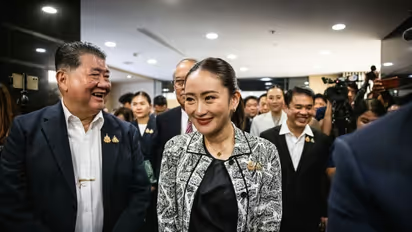Paetongtarn Shinawatra elected as Thailand's next prime minister, becomes country's youngest-ever leader

Synopsis
Paetongtarn Shinawatra, leader of the Pheu Thai Party, has been elected as Thailand's 31st Prime Minister, marking a significant milestone as the country’s youngest-ever leader.
Thailand's Parliament elected Paetongtarn Shinawatra, the youngest daughter of former leader Thaksin Shinawatra, as the country's new prime minister on Friday. Paetongtarn is now the third Shinawatra family member to hold the prime ministerial position, following in the footsteps of her father, Thaksin Shinawatra, who was ousted in a coup before returning from exile last year, and her aunt, Yingluck Shinawatra, who remains in exile. At 37, Paetongtarn also becomes Thailand’s second female prime minister and the country's youngest leader.
She secured the position with 319 votes in favor, 145 against, and 27 abstentions. The voting process, conducted publicly, took about an hour as members of Parliament cast their votes one by one.
Paetongtarn leads the ruling Pheu Thai party, though she was not an elected lawmaker—a requirement not necessary for prime ministerial candidacy. She was the sole nominee and achieved a majority of the votes in Parliament.
The previous prime minister, Srettha Thavisin, was removed by the Constitutional Court just two days prior, following an ethics violation.
Thaksin Shinawatra, one of Thailand’s most popular yet polarizing figures, was ousted by a military coup in 2006. He remains widely regarded as the de facto leader of Pheu Thai, the latest in a series of political parties associated with him. His enduring popularity and influence significantly contribute to the political backing Paetongtarn enjoys.
Paetongtarn's formal entry into politics began in 2021 when the Pheu Thai party appointed her to lead an inclusion advisory committee. She was named leader of Pheu Thai last year, after being selected as one of the party's three prime ministerial candidates ahead of the elections.
While campaigning for Pheu Thai, Paetongtarn acknowledged her family's political legacy but emphasized that she was more than just her father’s proxy.
“It’s not the shadow of my dad. I am my dad’s daughter, always and forever, but I have my own decisions,” she told a reporter.
However, her father's influence looms large, making it difficult to separate her leadership from his continued control over Pheu Thai, noted Petra Alderman, a political research fellow at the University of Birmingham in England.
“Thaksin was a political force to reckon with, but he was also a liability,” she said, “He has a tendency to overplay his political hand, so serving in his shadow has never been easy.”
Paetongtarn’s nomination came after Prime Minister Srettha Thavisin was ousted on Wednesday, less than a year into his term. The Constitutional Court found him guilty of a serious ethical violation related to the appointment of a Cabinet member who was imprisoned for an alleged bribery attempt.
This was the second significant court ruling to disrupt Thai politics in a week. Just days earlier, the same court dissolved the progressive Move Forward party, which had won the general election last year but was prevented from taking power. The party has since rebranded itself as the People’s Party.
Since 2001, Pheu Thai and its predecessor parties had consistently won national elections, driven by core populist policies aimed at addressing economic issues and reducing income inequality. However, they lost to the reformist Move Forward party in 2023. Despite this, Pheu Thai was given the opportunity to form a government after Move Forward was blocked from power by the previous Senate, which was appointed by the military.
Move Forward was excluded from the coalition by Pheu Thai, which instead aligned with parties linked to the military government that had previously ousted it in a coup. This decision faced criticism from some supporters, but party officials justified it as a necessary step to break the political deadlock and initiate reconciliation after decades of deep divisions.
Thaksin returned to Thailand last year after years in exile, in what many saw as part of a political deal between Pheu Thai and their long-standing rivals in the conservative establishment to prevent the Move Forward Party from forming a government.
Previously, former senators had the special power to veto a prime ministerial candidate under a constitution adopted in 2017 during a military government. However, that power expired when their term ended in May. The new members of the Senate, selected through a complex process last month, do not have the veto power, meaning a candidate now requires only a majority from the lower house, or at least 247 votes.
According to Napon Jatusripitak, a political science researcher at Singapore’s ISEAS-Yusof Ishak Institute, the coalition under Paetongtarn’s leadership could strengthen its unity because she has something Srettha lacks—a direct connection to her influential father, who ultimately has the final say.
“In a strange way, it creates a clear chain of command and curbs factionalism,” he said. “Paetongtarn will be given clear jurisdictions on where she can exercise her own agency and where it is a matter between her father and the coalition members.”
Check the Breaking News Today and Latest News from across India and around the world. Stay updated with the latest World News and global developments from politics to economy and current affairs. Get in-depth coverage of China News, Europe News, Pakistan News, and South Asia News, along with top headlines from the UK and US. Follow expert analysis, international trends, and breaking updates from around the globe. Download the Asianet News Official App from the Android Play Store and iPhone App Store for accurate and timely news updates anytime, anywhere.